by Mebane Rash, EdNC
May 19, 2025
“Kids on Campus” is a national partnership between the Association of Community College Trustees (ACCT) and the National Head Start Association (NHSA) “to advance student-parent success and the school readiness of young children from families with low incomes by bringing more Head Start child care centers to more community college campuses.”
The five-year initiative aims to establish at least 50 such programs by 2030, according to a press release.
“Two of the most effective strategies for reducing poverty,” says a recent report about Kids on Campus, “are providing high-quality early childhood education for young children and supporting parents through education and training that will advance their career goals.”
Three community colleges in North Carolina already have Head Start on campus: Blue Ridge Community College, Halifax Community College, and Lenoir Community College.
At the same time, headlines initially indicated that President Donald Trump “wants to gut Head Start,” and in North Carolina, Gov. Josh Stein, Lt. Gov. Rachel Hunt, and Superintendent Mo Green in response urged Congress to maintain Head Start funding.
“More than 19,500 children in North Carolina rely on Head Start and Early Head Start for high-quality child care, access to health screenings, and healthy food to prepare them for school and beyond,” says a letter from the state leaders.
Trump”s “skinny budget” did not include cuts to Head Start, and Secretary Robert Kennedy recently testified in a Congressional committee hearing that the U.S. Department of Health and Human Services will preserve Head Start with the president’s budget recommending ongoing funding at the FY 2025 level.
Yet the 22nd annual 2024 State of Preschool Yearbook finds that federal funding uncertainty is putting more pressure on states to close preschool access and quality gaps. And New America and The Hechinger Report have highlighted the need for more — not less, as is the trend — early childhood education on campus.
Given all that, EdNC conducted this model analysis on the role community colleges have played historically and are playing now in addressing the gap across North Carolina.
Kids on Campus provides one model for providing early childhood education on the campuses of community college.
But in North Carolina, where our community colleges are 58 strong, other models of providing care have survived and even thrived — and also address the two most effective strategies for reducing poverty.
In North Carolina, EdNC has documented the role community colleges play as anchor institutions in their communities.
Whether it’s Kids on Campus or another model, the Kids on Campus report makes the case for providing early childhood education on the campuses of community colleges.
For student parents and community colleges, according to the report, the benefits include:
- Capacity to support students’ basic needs;
- Support for enrollment, persistence, and completion among eligible students; and
- Access to a high-quality early learning program.
For children and families, including faculty of the community college, according to the report, the benefits include:
- Co-located, high quality, early learning opportunities;
- Access to additional co-located resources for parents, children, family members; and
- Early exposure to higher education, also called higher education modeling.
The Kids on Campus report also documents additional benefits when the model involves partnering with Head Start.
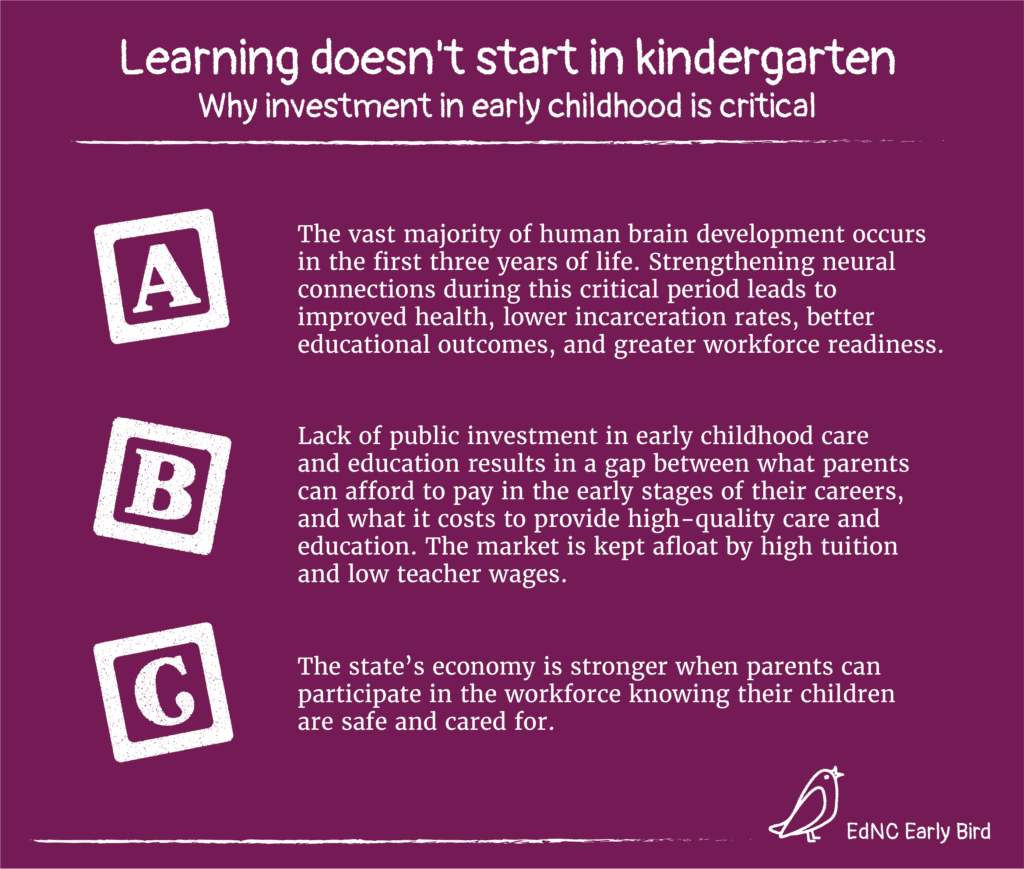
Lt. Gov. Rachel Hunt’s “Future-Ready North Carolina” plan calls for more community colleges to provide on-campus early childhood education programs to “leverage our excellent community colleges, strengthen experiential programs for child care professionals, and increase options for students and working families.”
What is CCAMPIS?
CCAMPIS is pronounced “see campus” and stands for Child Care Access Means Parents in School, a program of the U.S. Department of Education that “supports the participation of low-income parents in postsecondary education through the provision of campus-based child care services,” according to the website.
“Funds are used to support or establish campus-based child care programs primarily serving the needs of low-income students enrolled in IHEs. Grants may be used for before- and after-school services. In addition, grants may be used to serve the child care needs of the community served by the institution.
— U.S. Department of Education
According to the U.S. Department of Education, community colleges are “eligible to receive a grant under this program if the total amount of all Federal Pell grant funds awarded to students enrolled at the institution of higher education for the preceding fiscal year equals or exceeds $350,000.”
In 2023, the maximum annual award amount was $500,000 “or the amount equivalent to the product of $100 multiplied by the institution’s total number of Pell Grant recipients in FY 2022, whichever amount is greater.”
Forsyth, Carteret, and Halifax Community Colleges have collectively received $1,584,881 in funding from CCAMPIS since 2011.
| College | 2011 | 2012 | 2018 | 2019 | 2020 | 2021 | 2022 | 2023 | Total |
|---|---|---|---|---|---|---|---|---|---|
| Carteret Community College | $18,047 | $17,996 | $30,000 | $39,000 | $105,000 | $210,043 | |||
| Forsyth Technical Community College | $124,964 | $124,964 | $124,964 | $124,964 | $372,991 | $372,991 | $1,245,838 | ||
| Halifax Community College | $30,000 | $30,000 | $30,000 | $39,000 | $129,000 | ||||
| $1,584,881 |
Here is all of the data on this federal funding. There is an FAQ about this federal funding (click on the resources tab and then scroll down). No community colleges in North Carolina received funding between 2013-17, according to the data reviewed by EdNC.
North Carolina’s 58 community colleges and the role they play in providing early childhood education
Community colleges play an integral role in the provision of early childhood education in North Carolina.
Faculty are seen as thought leaders locally and statewide on early childhood development.
Community colleges train early childhood educators, and some campuses have early childhood classroom laboratories for training.
The N.C. Community College Child Care Grant program gives each of the 58 community colleges grant funding to distribute to their student parents to help them cover child care costs. Some colleges also offer early childhood education scholarships — including Caldwell Community College & Technical Institute and Craven Community College — or access to federal funding — including Carteret Community College.
How can the N.C. Community College Child Care Grant program help more student parents?
Small business centers at community colleges provide support for local providers of early education.
And some community colleges provide early childhood education on campus.
Currently, of the 58 community colleges in North Carolina, 17 offer on-campus child care, 21 have shuttered on-campus child care, and 20 have never operated on-campus child care that we can document.
According to EdNC’s analysis of federal data, just over 20 years ago in 2004, 29 community colleges in North Carolina offered dependent care on campus.
Learnings from those that provide on-campus early childhood education
Of the 17 community colleges that offer on-campus child care, 13 offer a licensed, five-star, on-campus child care center. Some are also accredited by the National Association for the Education of Young Children (NAEYC). Some are operated by the community college. Others have third parties operate the centers. Some offer full- and part-time options. Some operate year-round. At least five offer NC Pre-K. Three are a Head Start site.
Some charge by the week while others charge monthly, and the amount tends to depend on the age of the child. For the providers where we have tuition information, the range of tuition is $700 to $1,083 per month, and $848 is the average for the highest cost care.
One community college provides both a center and drop-in care. One is paying for drop-in care for student parents at a local community provider.
According to EdNC’s Liz Bell, “Drop-in care is more flexible and affordable than traditional all-day child care for parents. It’s also easier for providers to open. In North Carolina, programs do not have to go through the child care licensing process, with its own rules and regulations, if they limit care to four hours per day.”
One was designed to serve as a regional lab. Some offer afterschool and summer care.
Note that some of these community colleges have also shuttered on-campus child care operations.
Most community colleges are braiding funding sources to provide this service, including federal, state, and local funds, grants from philanthropy, tuition and fees, scholarships, and other sources of revenue.
From our analysis of the 17, five models emerged:
- Licensed, on-campus child care, currently provided at 13 community colleges;
- Both licensed, on-campus child care and drop-in care, currently provided at Cape Fear Community College (operating both) and Forsyth Technical Community College (operating a lab, outsourcing drop in care to a local provider, and providing care for particular on-campus events);
- Head Start, currently at Blue Ridge Community College, Halifax Community College, and Lenoir Community College and Halifax Community College;
- Afterschool and drop-in care, currently provided at Sandhills Community College; and
- Drop-in care, currently provided at Central Carolina Community College.
Learnings from those that have closed on-campus early childhood education
Twenty-one community colleges used to have on-campus early childhood education.
The primary reason community colleges close on-campus child care is because it is hard to break even financially. According to interviews with EdNC, other reasons include space considerations, workforce availability, and competition with local providers.
Community college leaders describe the decision to close as “agonizing,” compounded by the fact that many centers serve students and faculty. In the news articles and board minutes linked below, you can see how long it takes to wind down a center and the efforts taken to find other child care for the students and other jobs for the educators.
The recession in 2010 and the pandemic in 2020 influenced some closures, but in some cases, federal dollars related to the pandemic were used to support the provision of child care.
Next steps for North Carolina
“Kids on Campus is off to a strong start,” said ACCT Vice President for Public Policy Carrie Warick-Smith in the press release.
In its first year:
- 87 community colleges and 98 Head Starts took the initial step in connecting and engaging with Kids on Campus.
- The partners have found 18 potential matches between community colleges and Head Start programs interested in exploring partnerships.
- Two new Kids on Campus partnerships launched in Fall 2024, and a third is set to open in late spring 2025.
- Kids on Campus-Texas was launched as its first state-focused initiative.
The ACCT and NHSA invite community colleges, Head Start centers, and philanthropic supporters who are interested to reach out.
In North Carolina, additional research is needed on need and access to inform local, state, and philanthropic priorities.
Regarding need, Kaitlyn Newhouse with the Belk Center for Community College Leadership and Research said that in qualitative interviews with adult learners, they attributed much of their academic success to having access to child care grants, and in a survey of adult learners who have stopped out of community college, child care — or lack thereof — is mentioned frequently as a barrier to re-enrollment.
Zach Barricklow with the N.C. System of Community Colleges suggests that a next step in mapping access would be to map all five-star centers relative to the locations of community college campuses.
To consider providing early education on campus, presidents and local board of trustees will need to see at least a playbook and possibly a case study on how to make an on-campus center care financially sustainable. Many presidents acknowledge the need.
When Pamela Senegal started serving as president of Piedmont Community College in 2017, its center was losing money.
To make it work, Senegal brought in new leadership, and together they leveraged multiple streams of funding, increased salaries, expanded the ages served to 2-5, stayed open from 7 a.m. to 5:30 p.m., accepted children who weren’t potty-trained, started profitable summer programs, and figured out how to stay open during COVID-19.
“I’m so incredibly proud of our child development center,” said Senegal, who could have chosen to close the center. “We had to dig in and figure out some better solutions to make sure that we could continue to provide this service, which is an attractor for employees and students who might have young children, a service for the community, and it’s great for our own early childhood program — our students get to do some of their clinical time in that setting. It was just the right thing to do, but we had to figure out how to do it in a way that was financially sustainable.”
McDowell Tech is currently working on a playbook that will be published in 2025.
Based on our interviews, if a case study is warranted, then it should address:
- The reasons community colleges prioritize the provision of child care on campus;
- Factors that influence the type of child care provided on campus, including the local care landscape;
- The braiding of funding sources, including revenue and expenses of financially sustainable centers;
- How colleges balance the local need for child care educators with the low wages currently offered across the field; and
- How community colleges address the liability of having a center on campus.
A playbook on Cape Fear’s drop-in care program would also be helpful to community colleges considering that model of care.
For licensed centers that are under-utilized, advocates need to explore the regulatory changes needed for that capacity to be used for drop-in care.
Philanthropy could consider prioritizing community colleges that have un- or under-utilized existing classrooms, at least for drop-in care.
“In addition to coming up with a financially sustainable model,” said Deborah Walsh, then dean at Guilford Technical Community College in an interview with EdNC in 2022, “we need to change minds and change hearts.”
“We need state and federal policymakers to see early educators as essential workers,” she said. “Our students need to be equipped to serve as early educators but also as advocates for higher wages. And both early educators and our faculty need to be paid better.”
If you are interested in on-campus early childhood education, there is a National Coalition for Campus Children’s Care, called N4C, which has been around since the 1970s. Campus Children’s Center Week is Oct. 6-10, 2025, and the 54th Annual Conference and Professional Institute will be at the Hyatt Regency in San Antonio, Texas, March 18-21, 2026.
Below you will find information about each of the 58 community colleges and the provision of on-campus child care.
The 17 community colleges that provide on-campus early childhood education
Alamance Community College has a licensed, five-star, on-campus child care center called the Lifespan-Early Learning Center that is open to children of students, faculty and staff, and the community. According to the website, the center serves as a laboratory for training students enrolled in the early childhood associate curriculum. All lead teachers in the center have an associates or higher college degree in the early childhood field. The center is open year-round from 7 a.m. to 5:45 p.m., Monday through Friday. It currently serves about 50 students ages six weeks to 5 years old, and it has openings.
In 2022, when EdNC spoke with Sonya McCook, the dean of arts and sciences, and Lisa Johnson, the vice president of instruction, they said the center removes a barrier that helps people work and provides on-the-job experience. They noted that child care access is linked to attainment, both for their students and employees.
Blue Ridge Community College has partnered with WNCSource to operate three early childhood classrooms on its Henderson County campus at the Flat Rock Children’s Center, dedicated specifically to serving Early Head Start children ages 0 to 3.
Blue Ridge also has a new, state-of-the-art instructional classroom.

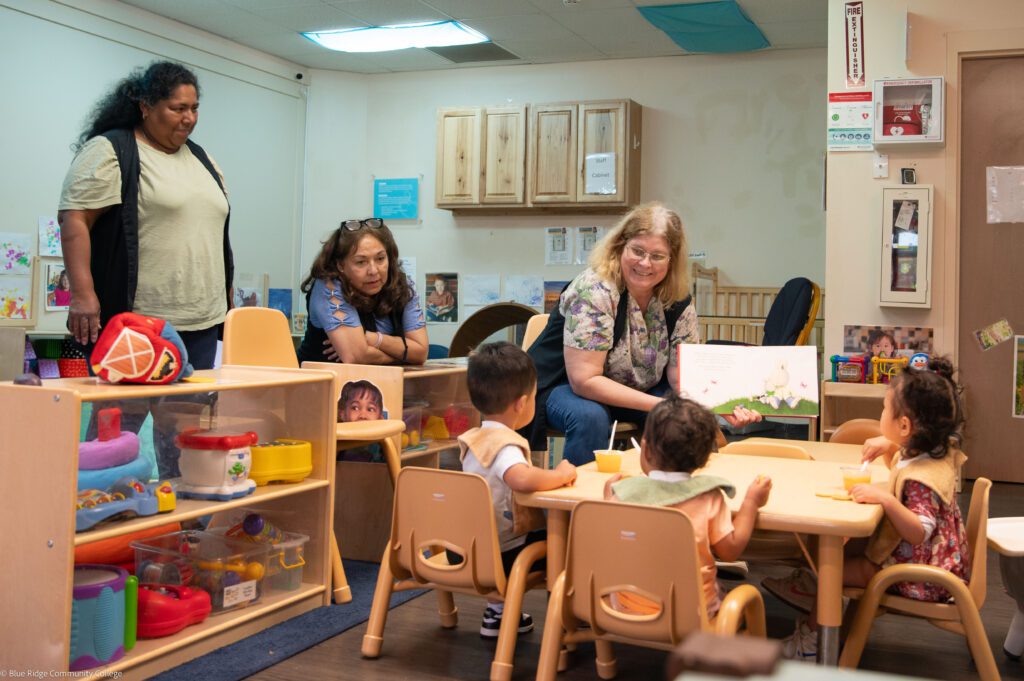
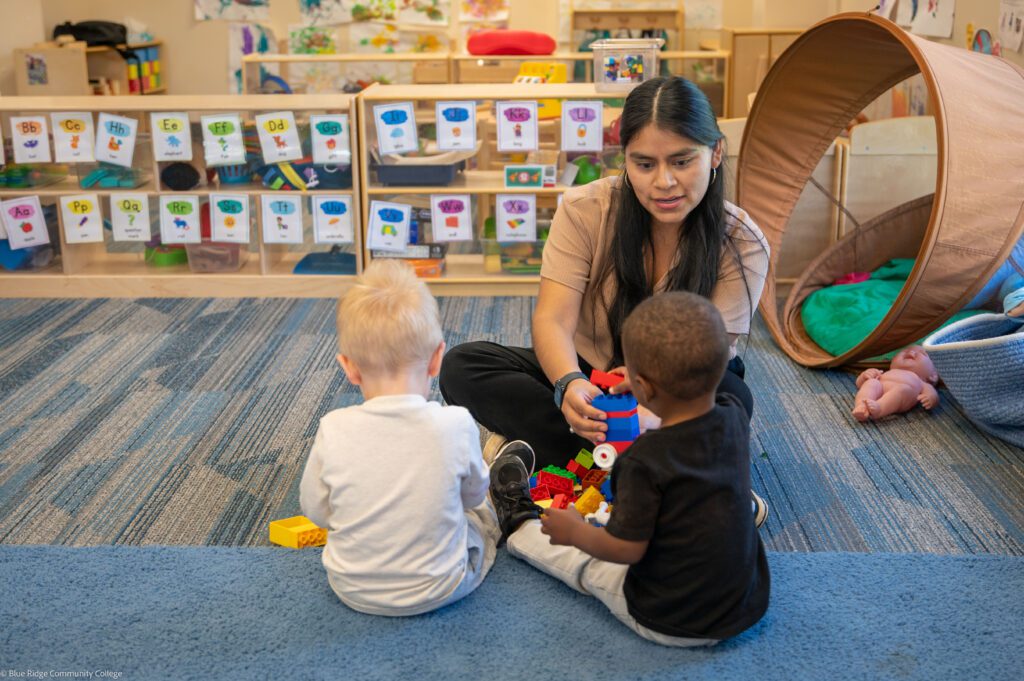
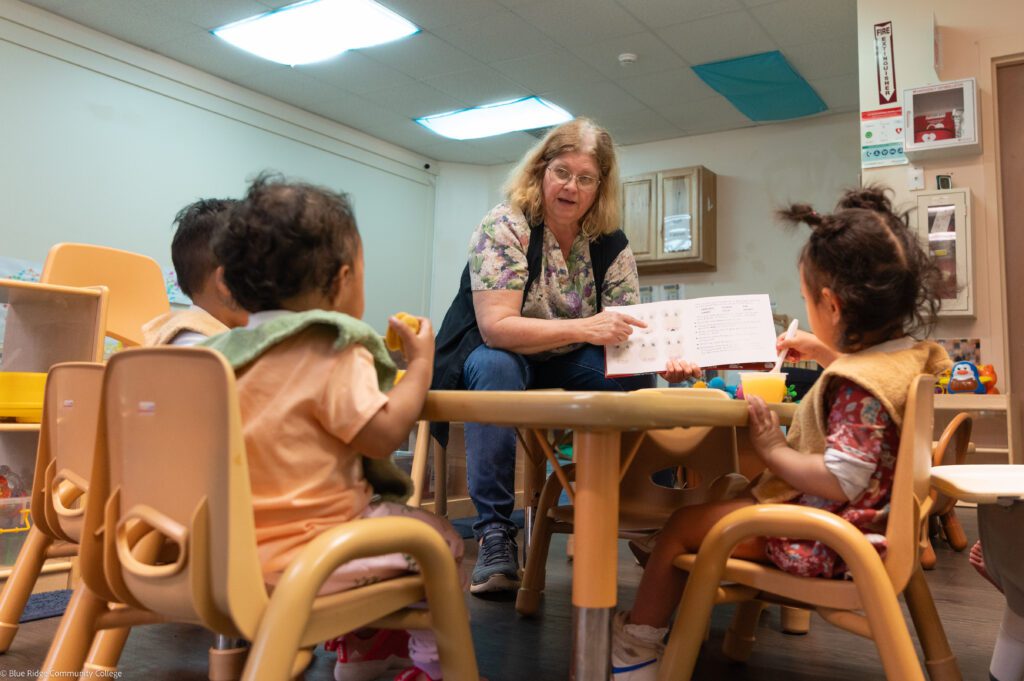
Cape Fear Community College operates a licensed, five-star, NAEYC-accredited, full-day program at Bonnie Sanders Burney Child Development Center, serving children ages six weeks to five years old, 7:30 a.m. to 5:30 p.m., Monday through Friday.
According to the website, the center has six classrooms, one multi-purpose room, a parent/staff resource room, three bathrooms, a kitchen, a reception area, and an office. It has a fenced-in outdoor learning environment, which includes a bricked and railed activity deck.
The program’s maximum enrollment capacity for children is 80, and it costs $250 per week.
In fall 2023, Cape Fear Community College became the first community college in North Carolina to offer a free, drop-in program for enrolled student parents. Called CFCC’s Drop-In Childcare Center, child care is available from 7:30 a.m. to 5:30 p.m., and the center serves children six months and up. Children can stay for up to four hours per day by state regulation.
“We are thrilled to introduce this initiative and break down obstacles that often prevent student-parents from pursuing their educational aspirations,” said CFCC President Jim Morton. “We firmly believe that everyone should have equal opportunities to succeed, and by offering free drop-in child care, we are helping to remove any of the significant obstacles our students face.”
The community college was able to get this service up and running thanks to a $250,000 grant from the New Hanover Community Foundation and other private donations, according to a press release.
Cape Fear Community College is offering free drop-in child care for students. Here’s how.
During fall, spring, and summer semesters, on-campus child care is provided free to students while they are on campus and attending a class, tutoring, or school event. Child care is available Monday through Friday from 8:00 a.m. until 12:00 p.m. and Monday through Thursday evenings from 5:30 p.m. until 9:00 p.m.
A long time ago, there was a Stop-n-Drop Academic Center located on campus in Sanford. Charlotte McLean was the owner-director and was known to her students as “Miss Charlotte.” She was an alum of CCCC, where she earned her degree and received support for starting her small business.
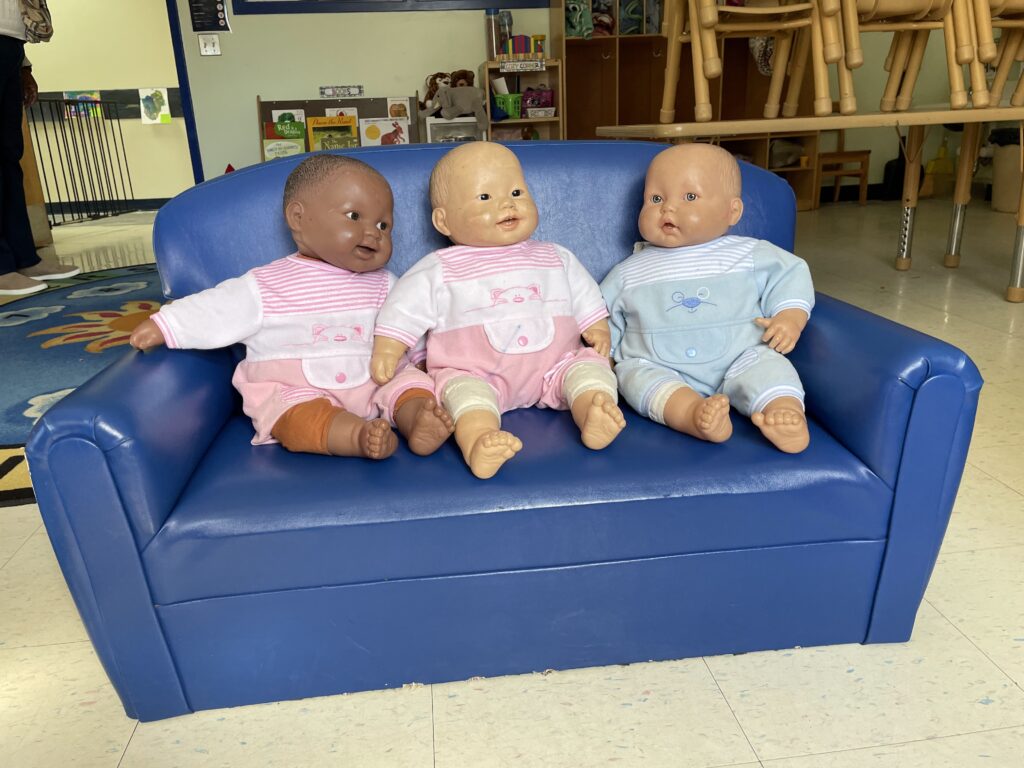
The Davidson-Davie Child Development Center is a licensed, five-star center serving students, faculty, and the public. It is open 7:00 a.m. to 5:15 p.m., Monday through Friday. It offers NC Pre-K.
According to the website, “Tuition is $750/month for infants and $720/month for Toddlers through Preschool. Tuition can be paid monthly or semi-monthly. Tuition prices may vary if you have a subsidy from an outside agency.”
The center serves as a hands-on laboratory site for students enrolled at Davidson-Davie.
There used to be a second site in Davie County.
In an interview with EdNC in 2022, Sharon Carter, a professor in early childhood education, said the college’s commitment to providing early childhood care and education is driven by it being seen “as a community need.”
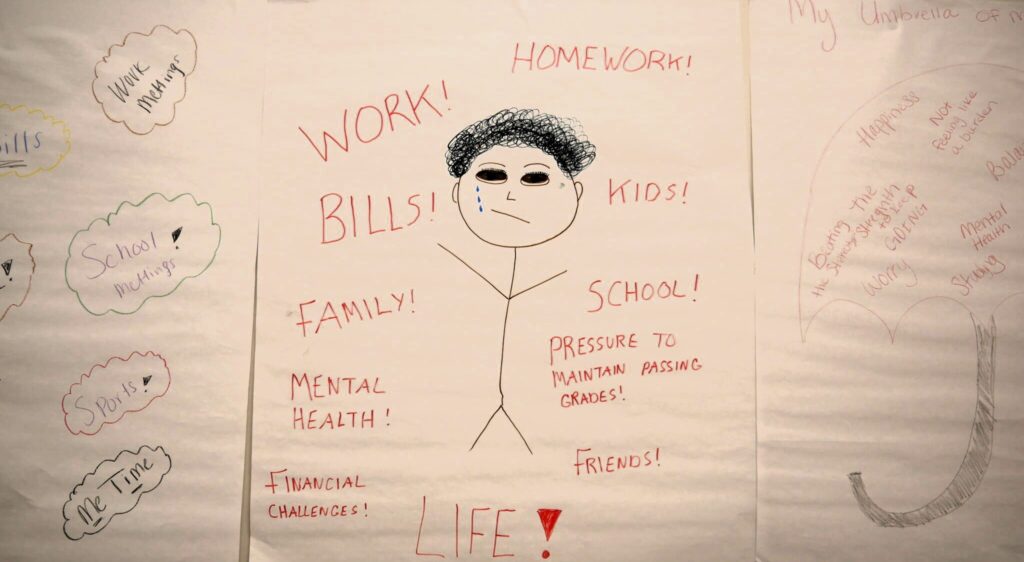
Forsyth Tech operates the licensed, five-star Carol L. Danforth Early Childhood Lab as part of its early childhood department. The lab is a full-day program, open from 8 a.m. to 5 p.m., Monday through Friday.
The maximum capacity for the class is 15 children, between the ages of 3-5. Each child must be toilet trained. Registration is $80, and monthly tuition is $700.
Beyond its lab school, according to reporting by EdNC’s Liz Bell, Forsyth Tech is leading the way in holistically supporting student parents. It is one of five colleges across the country chosen to participate in New America’s Child Care for Student Parents Cohort, which is researching innovative practices and policies to support student parents.
An initiative, called SPARC (Student Parent Advocacy Resource Center), helps students afford care at the lab school and at private programs in the community, connects students to drop-in care through a partnership with a local provider, hosts student parent expos, and creates spaces for student parents to build community and shape the school’s policies.
Additionally, Forsyth Tech often offers child care during events that support attainment, such as Rock Enroll (an enrollment and advising event), orientation sessions geared towards adult learners, and financial aid/FAFSA assistance workshops.

Halifax Community College has a licensed, five-star, NAEYC-accredited Head Start site on campus operated by the Choanoke Area Development Association of NC.
Latosac Crossen Brown is the director. Her center is open 10 months a year, 8:15 a.m. to 2:15 p.m., Monday through Friday. The center serves 45 students in three classrooms. The staff of 10 includes seven educators, one family service specialist, one cafeteria worker, and the center director.
But, she says, running a center is about more than numbers.
There are times when early childhood educators are overlooked, but I make it a priority to appreciate and empower my staff every single day. I want them to continue doing what they are passionate about and what they love — shaping young lives with care and dedication.
Before becoming a center director, I started my journey as an after-school teacher, teacher assistant, and then became a teacher for CADA Head Start. I have always loved serving my students, their families, and my community.
This work is more than a job. It’s a calling, and I’m proud to support others who feel the same.
— Latosac Crossen Brown
The Regional Center for the Advancement of Children is a licensed, five-star center located on the campus of Haywood Community College that serves more than 80 young children. This center offers NC Pre-K.
The still state-of-the-art facility — designed to be a regional laboratory with observation and convening space — was built in 2008 with the support of The Duke Endowment and The Janirve Foundation.
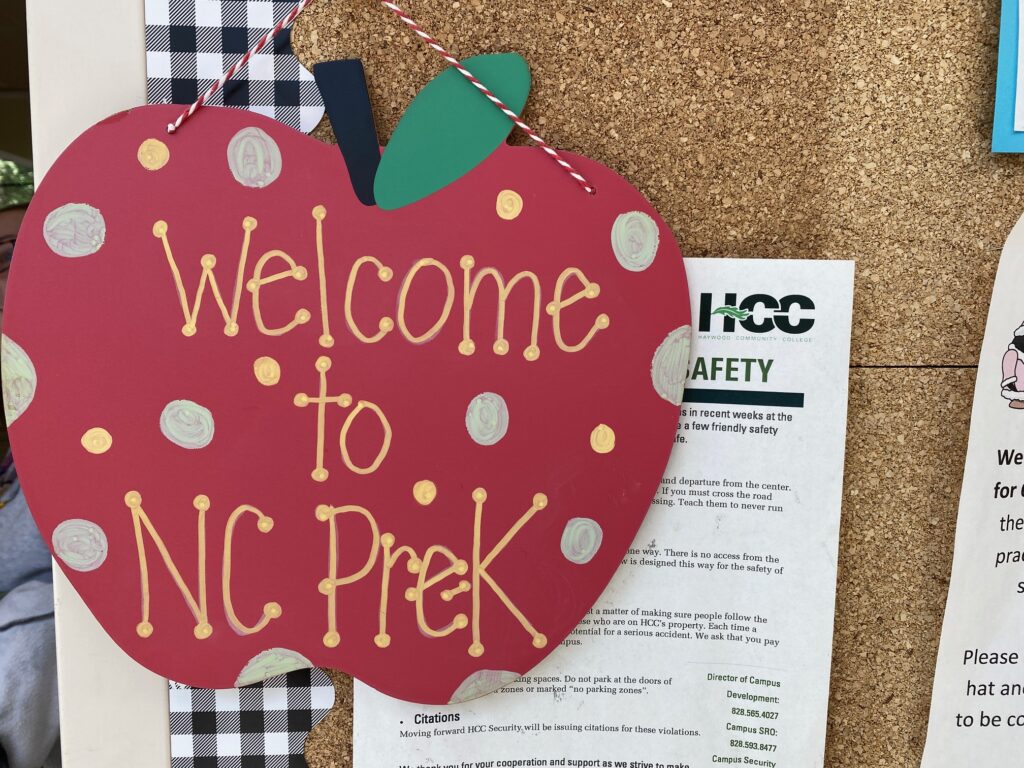
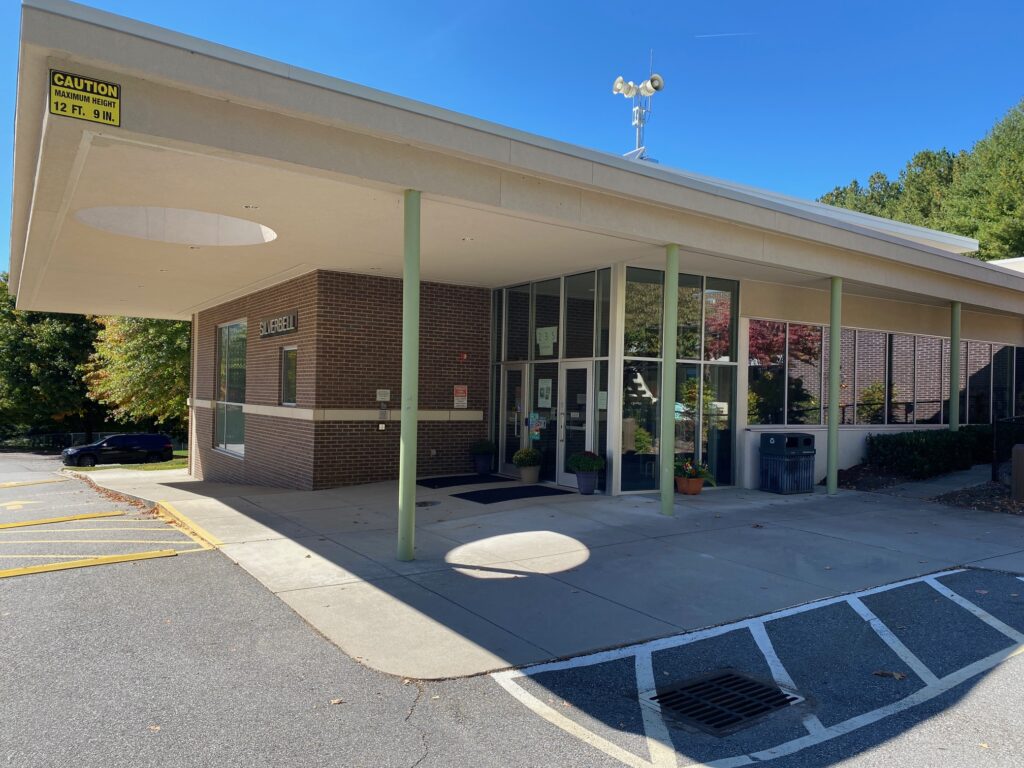
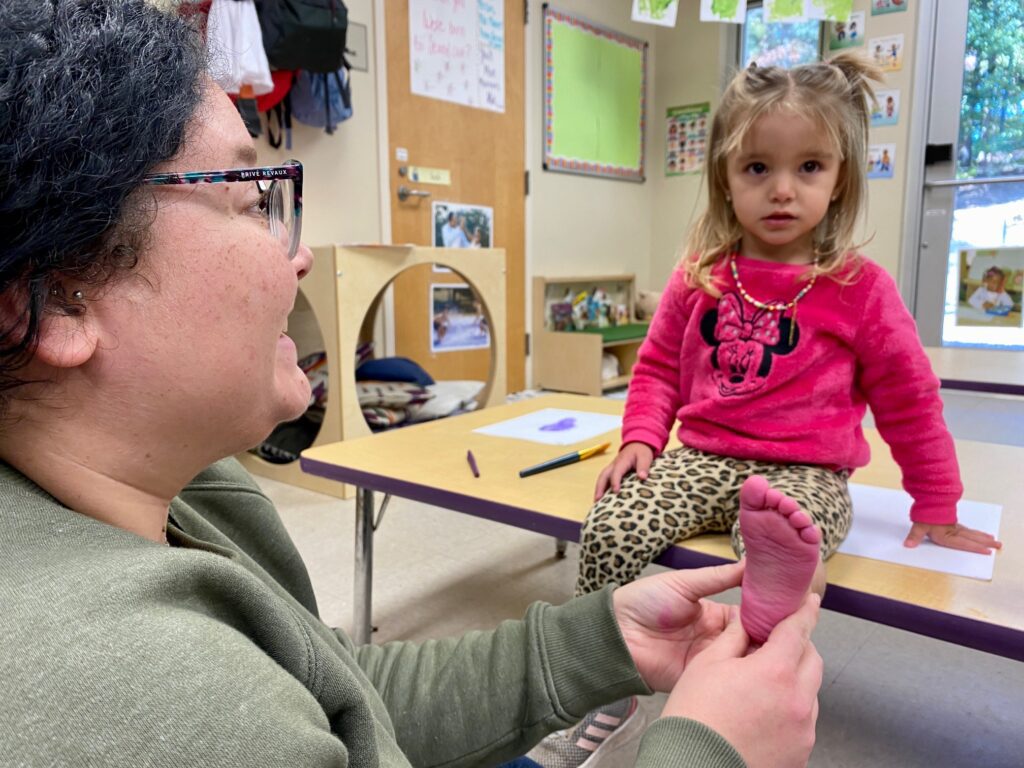
The center, which offers care from six weeks to 5 years old, is open weekdays from 7:30 a.m. to 5:30 p.m. to support working and student-parent schedules.
Tuition prices range from $750 to $950 per month for full-time care and $450 to $590 per month for part-time care.
According to the website, “The Johnston Community College Child Development Center was established in 1998 as an extension of the Early Childhood Education department to serve the needs of students in the program, as well as parents attending classes at the college and community families who need quality care for their children during working hours. Since then we have grown from one classroom of preschoolers to a child care program for toddlers to preschoolers.”
The center is licensed, five-star, and NAEYC-accredited. It offers NC Pre-K. It is open 7:30 a.m. to 5:30 p.m. to support working and student-parent schedules. There is a $50 registration fee, and the cost, which is based on age, ranges from $170-$205 per week.
In our interviews, the faculty noted they would like to have an infant room but don’t have the space. They would also like to have drop-in care, but the regulations on licensure keep the facility from being used for both purposes.
According to interviews with community college leaders, the community college used to have three Head Start programs on campus, and students were able to use them for observations.
Currently, Greene Lamp’s South Greene Head Start site is located at Lenoir Community College’s Workforce Development Center.
The McDowell Technical Community College Child Development Center is a licensed, five-star child care center providing care for children ages six weeks to 5 years old. This center offers NC Pre-K and uses the HighScope Preschool Curriculum.

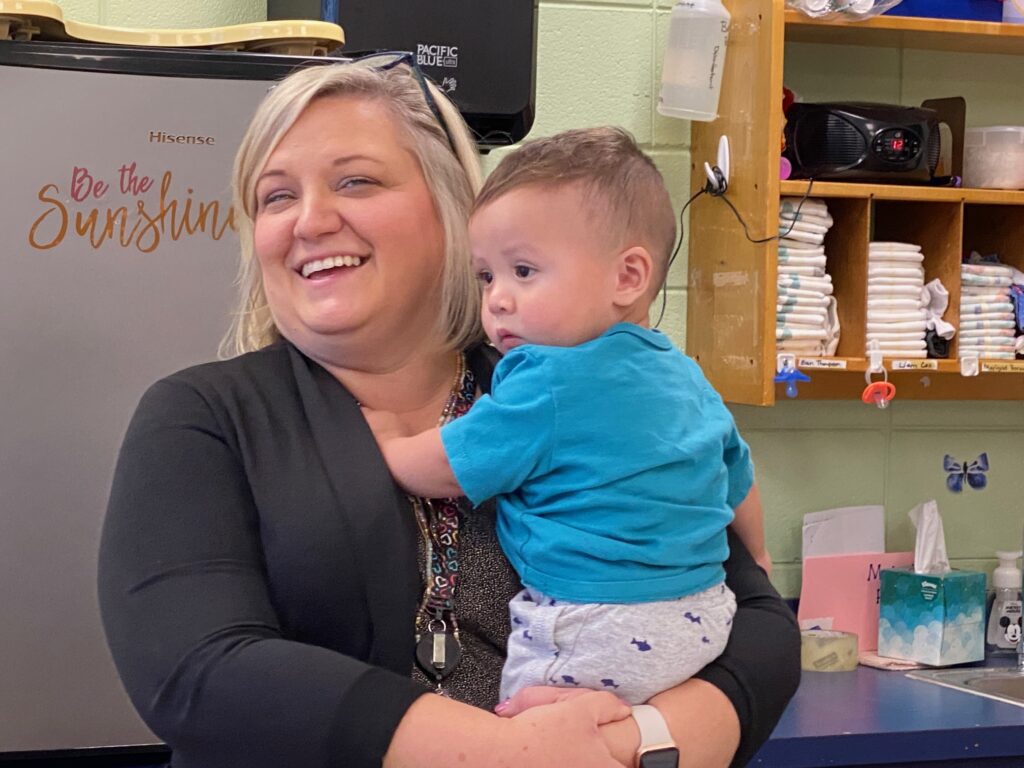

This model center trains teachers and other employees to work in child care centers throughout the state. When EdNC visited the center in 2022, even the then-president’s child attended the center.
The center is open from 7:30 a.m. to 5:30 p.m. Monday through Friday.
Full-time and part-time slots are available for students, faculty and staff, and the community.
In 2023, MTCC received a $985,000 grant from Dogwood Health Trust to create a playbook or guide to assist other community colleges throughout North Carolina in replicating McDowell Tech’s model child care center. It will be published in summer 2025.
The licensed, five-star Betsy B. Currin Child Development Center has operated on the campus of Nash Community College since August 1999.
“The goals of the Child Development Center are to provide quality early education for children six weeks to five years of age and to serve as a model training program for Nash Community College students and the community,” according to the website.
Serving about 40 students, it is open from 7:30 a.m. to 5:30 p.m. About 40% are children of faculty and staff, and 60% are families in the community.
There is a $50 registration fee, and tuition ranges from $755 to $825 per month based on the age of the student.
Check out the before and after renovations in 2013 here, supported by the master plan in partnership with NC State Design’s National Learning Initiative.
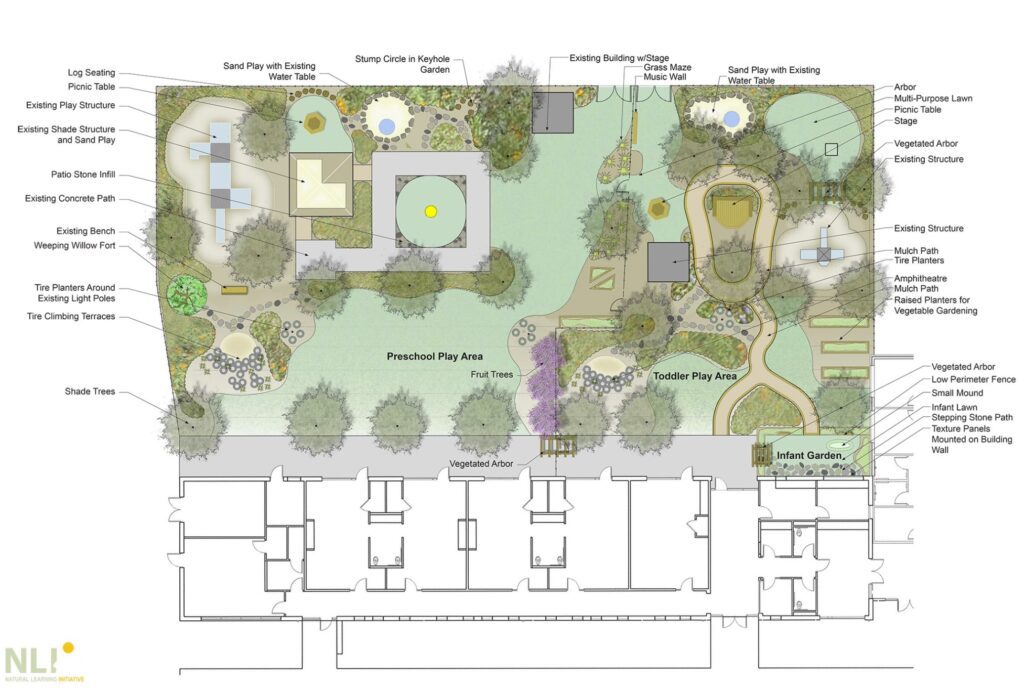
Operational since 1977, the Piedmont Community College Child Development Center is licensed with a five-star rating. It offers NC Pre-K.
The center is open to children of students, faculty and staff, and the public. It has an enrollment capacity of 34 children, and it is open 7 a.m. to 5:30 p.m., Monday through Friday, year-round.
Sandhills Community College
Since 2022, Sandhills Community College has been the site of a Boys & Girls Club for kindergarten through fifth-grade students. Transportation from Pinehurst, McDeeds Creek, Farm Life, and Carthage elementary schools is available, according to the website. Participants receive homework assistance and dinner.
Afterschool care is available 2:30-6:30 p.m., Monday through Friday.
Drop-in services are available 6:00-9:00 p.m., Monday through Friday, and are free of charge to Sandhills students.
The model previously existed at only one other community college in the country, said Taylor McCaskill, director of the college’s transfer center. The idea arose during conversations over lunch that McCaskill had with Fallon Brewington, vice president of continuing education and workforce development at the college — and former CEO of the local Boys and Girls Club.
Thirty-eight children are being served in afterschool care, with plans to serve more in structured drop-in services in the evening.
Parents do not have to be students to use the club.
The Boys and Girls Club will help not only current students in need of care during class or studying, but will open the college to a new population of parents who might be interested in coming back to school, McCaskill said, according to reporting by EdNC’s Liz Bell.
Since the community college opened, it has always had on-site child care. The five-star SCC Child Development Center serves children ages six weeks to 5 years old. It offers NC Pre-K.
According to the website, “The SCC Child Development Center is a lab preschool that serves as a component of the instructional program for students in the Early Childhood Education Department, as well as other programs at Southeastern Community College.”
It is open 7:00 a.m. to 6:00 p.m., Monday through Friday.
“Future plans,” according to interviews with EdNC in 2022, “include expanding its new afterschool program, offering summer camps/programs, expanding to open as infant room, opening another NC-PreK classroom.”
Vance-Granville Community College operates a licensed, five-star child care center as a training laboratory for the early childhood education program.
Serving 40 students, the center is open 7:30 a.m. to 5:30 p.m., Monday through Friday. Breakfast, lunch, and snacks are served.
The center, which is located on the college’s main campus in Henderson, consists of 6,000 square feet. It contains four individual classrooms, a multi-purpose room, a kitchen for the preparation of meals for the children, a staff workroom/lounge, and a manager’s office, according to the website.
Tuition is $740 per month for children aged 1 and 2 and $715 for those aged 3 to 5. Priority for enrollment is given to siblings of currently enrolled children first, children of current VGCC students second, children of VGCC’s employees or board members third, and members of the surrounding communities last.
Wayne Community College operates the licensed, five-star WCC Child Care Center. It offers full-time care for children ages six weeks to 5 years. WCC Child Care Center is open to the public, but placement preference is given to WCC students, faculty, and staff. The center is open 7:00 a.m. to 6:00 p.m., Monday through Friday.
A-B Tech closed its child care center in the summer of 2015 “after losing more than $500,000 over the last four years,” according to an article in the Asheville Citizen Times.
At the time, the center employed nine workers and enrolled 45 children — infants through pre-K — in Buncombe County.
The A-B Tech Board of Trustees approved the closure during a meeting on May 4, 2015.
“It’s an agonizing decision,” said Kerri Glover, the executive director of community relations and marketing at the college, at the time. “It’s not something we wanted to do at all. It’s purely a financial decision. As a public institution, we really can’t afford to continue operating on a loss.”
Glover adds now, “It had a long wait list, excellent teachers, and was always full, and even so it operated at a loss.”
The community college currently has a partnership with the YWCA to provide child care for students and some employees.
In response to the increasing demand for flexible learning options, Beaufort County Community College now offers its early childhood program primarily online. While the program previously included an on-campus instructional classroom — with supplies, materials, and access to an outdoor playground — this space was never a licensed facility and only served the community on a limited basis due to financial constraints.
Today, the shift to online instruction better supports our students, many of whom are working professionals balancing multiple responsibilities. The program continues to provide meaningful, hands-on learning through placements in local early childhood centers, allowing students to apply their knowledge in real-world settings.
Brunswick Community College closed its child care center on June 10, 2016, after operating since 2010, when it opened thanks to a bond referendum. The space has been repurposed for allied health programs, according to a report by WECT news.
The board of trustees approved the closure on March 17, 2016. According to news reports, the decision was because of a “persistent budget shortfall” at the college.
“The College acknowledges and recognizes the exceptional Early Childhood Education Center staff, management, and the assistance of Smart Start of Brunswick County who provided wonderful pre-school education in Brunswick County, as well as professional assistance to BCC students,” said then-President Susanne Adams.
The center had seven workers, of which five were full time, and served 31 preschoolers aged 3 and 4.
According to federal data, Catawba Valley had “on-campus day care for children of students” until 2011.
Central Piedmont had a child development center, nicknamed Kiddie Kollege, that opened in 1971 in what was at that time the Woodruff Building. The center was relocated in 1975 to a renovated college building where it operated until 1997.
The cap was 90 students, aged 2-5, and Kiddie Kollege regularly had a waiting list. The center closed due to declining enrollment, increased competition with growing child care options in the community, and the prohibitive costs of needed building maintenance and playground safety upgrades.
Durham Tech partnered with local provider Kate’s Korner to provide free part-time child care services and afterschool care on the college’s main campus in spring 2022. Drop-in services were available for 60 children beginning Jan. 31 through June. According to a press release, the service could no longer be provided when government funding that subsidized tuition for families ended.
On May 18, 2020, amid the pandemic, the Board of Directors of Fayetteville Technical Community voted to close permanently the early childhood education center on campus. At the previous board meeting in April 2020, an in-depth accounting of the finances and operations of the center was provided. At the time, 31 workers served 147 students aged 1-4. Afterschool care was also provided. There was community interest in summer camp.
Gaston College
Gaston College operated a child care development center for many years, according to minutes of the board of directors. “In April 2010,” say the minutes, “ownership and management of the child care center transitioned to a third party. The center closed shortly after the transition.”
In 2024, the board was still addressing debt collection of outstanding accounts of the center.
According to the Greensboro News & Record, the five-star GTCC Children’s Center “cared for the preschool-aged children of GTCC students, college faculty and staff members, and Guilford County residents” from 1979 through June 30, 2015.
The center was licensed to care for 61 preschool children between the ages of six weeks to 5 years. It needed 56 children to be profitable. Here is more information on enrollment and finances of the center in the years prior to closure.
According to federal data, James Sprunt had “on-campus day care for children of students” until 2006.
The Martin Community College child care center closed on Dec. 17, 2014, due to financial resources, declining enrollment, and a lack of available space.
Martin Community College Small Business Center supports the opening of local child care centers.
Child care center opens thanks to help from Martin Community College Small Business Center
Mayland Community College
The Phillips-Gwaltney Child Development Center (PGCDC) closed between 2009 (according to college leaders at the time) and 2012 (according to federal data). The five-star center was licensed for 115 children and was often full with a waiting list. The recession of 2008 caused the major employers in Mitchell County to close, forcing parents to cut back on expenses and remove their children from daycare. At the point of closing, the headcount was approximately 75 children, and break even for the facility was 100.
U.S. Rep. Virginia Foxx was the president of Mayland Community College when the center was first established.
According to community college leadership and confirmed by federal data, Montgomery Community College had an on-site child care center from 1977 until 2010.
According to federal data, the PCC Preschool Laboratory operated on campus until 2013.
In March 2024, according to a press release, “A new, cutting-edge classroom at Pitt Community College has given Education and Child Development students a real-world environment in which to prepare for early childhood education careers. Through a $30,000-Perkins Grant administered by PCC’s Office of Teaching and Learning, the college recently turned a standard Charles Russell Building classroom into a state-of-the-art preschool laboratory training facility.”
“Our preschool lab classroom represents a significant milestone in Pitt Community College’s commitment to excellence in early childhood education,” said Melissa Rees, chair of Pitt’s Education and Child Development (ECD) Department. “It provides a dynamic space for our students to apply theory to practice and prepares them for impactful careers.”
Rees says the preschool lab classroom follows curriculum standards established by the National Association for the Education of Young Children, ensuring a comprehensive and developmentally appropriate learning experience. It is open to ECD students, as well as instructors providing online learning, she said, adding that PCC’s Continuing Education Department will be using the facility between May 20 and July 26 to offer a series of summer camps for children ages 3-5 years old.
According to federal data, Roanoke-Chowan Community College had “on-campus day care for children of students” until 2008.
Rockingham Community College opened a child care center in 1990, and according to federal data, it operated until 2010.
According to the Hickory Daily Record, Rowan-Cabarrus Community College’s Early Childhood Center closed on June 30, 2010. It had been open since the late 1970s.
Terry Chapman, then RCCC Dean of Health and Public Service Technologies, said the community college had operated the center for two reasons: “First was to meet a real need in Rowan County for high-quality child care, offering an environment that stressed early learning and development. Second was to provide an opportunity for college students in RCCC’s early childhood programs to gain experience in caring for children and operating a model facility.”
At the time, the center — which had a capacity of 49 children between the ages of 2 and 5 — served 29 students.
The community college said an increase in the number of high-quality child care centers in the area contributed to the closure. It was never the mission, said college leaders, to compete with other providers.
President Carol Spaulding adds, “Of the children enrolled when it closed, only two had any relationship to faculty, staff, or students at the college. The program was operating with a $70,000 debt and the well respected head of the program retired.”
Because of the success of the program over the years, she said, there were many five star programs owned and operated by our graduates to fill the need.
“The child care space is now the location of four new or expanded health care programs providing the sorely needed workforce by the health care system,” said Spaulding.
Southwestern Community College had an on-campus child care center that was open for 20 years but closed in 2008, according to interviews with community college leaders.
According to interviews with community college leaders, Tri-County Community College closed its on-campus child care in December 2010.
Wake Technical Community College opened a child care center on its Southern Wake Campus in 1991 as a working lab for the early childhood education program. It closed in 2006 when the center operator’s lease ended and the college decided to renovate the building to meet the demand for additional classroom space.
Wilkes Community College closed its on-campus child care center in 2015. The program was not financially structured to operate without its corporate sponsorship from Lowe’s.
The 20 community colleges that have never provided on-campus child care
Twenty of the 58 community colleges in North Carolina have never offered on-campus child care: Bladen Community College, Caldwell Community College & Technical Institute, Carteret Community College, Cleveland Community College, Coastal Carolina Community College, College of the Albemarle, Craven Community College, Edgecombe Community College, Isothermal Community College, Mitchell Community College, Pamlico Community College, Randolph Community College, Richmond Community College, Robeson Community College, Sampson Community College, South Piedmont Community College, Stanly Community College, Surry Community College, Western Piedmont Community College, and Wilson Community College.
The background on EdNC’s model analysis
In fall 2022, EdNC visited all 58 community colleges in person, conducting research about on-campus child care programs. We asked leaders of the community colleges the following questions:
- How did you come to the decision about having or not having on-campus child care?
- If the community college had a current program:
- How many kids do you serve?
- How is it funded?
- What is the future of the program? Are there plans to cut back/close or expand?
- Does the center provide NC Pre-K?
- Does the center provide care to both students and community members?
- Does the center provide lab experiences to students?
- If the college doesn’t provide child care, why?
EdNC’s research protocol for our blitz of the community colleges was designed by our early childhood team.
In June 2024, EdNC’s Liz Bell updated our reporting on how community colleges provide child care support in partnership with NC State’s Belk Center for Community College Leadership and Research.
From January to April 2025, a team of students at Duke University’s Sanford School of Public Policy, including Chuhang Liu, Demia Tucker, and Katherine Mckenzie, began working on our model analysis by looking in-depth at Cape Fear, Haywood, Johnston, and Vance-Granville community colleges.
In addition, EdNC consulted websites, local news reports, and meeting minutes of local boards of trustees of community colleges. Five-star ratings were checked through this facility search. NAEYC accreditation can be confirmed in this directory, which is searchable by state.
We offered pre-publication review of this model analysis to leaders at all 58 community colleges and surfaced additional information through their responses. During the review process, we were in touch with 29 community colleges, the N.C. Community College System, the Belk Center for Community College Leadership and Research, and the N.C. Association of Community College Trustees.
We cross checked our data with IPEDS. In 1985-86, IPEDS started tracking “on-campus dependent care” in its survey of institutional characteristics under “other student services.” Note that this variable was previously called “on-campus day care for children of students.” EdNC’s look back extended to 2004. For a variety of possible reasons, in the most current IPEDS data, four community colleges that provide care are not included — Cape Fear, Davidson-Davie, Halifax, and Lenoir. Here is the federal data EdNC pulled using a “compare institutions” search for all 58 community colleges back to 2004 for this variable.
To find the federal data by community college, start here. Go to “look up an institution” which should take you here. Type in the name of the community college and push select. Then click by variable and then browse/search variables. Click on institutional characteristics to expand that menu. Click on non-traditional credits, special learning opportunities, student and library services to expand that menu. Click selected services. Click on all of the years of data that you want. Click on-campus day care for students’ children. Click continue. Click view/modify to the right of select institutions. Click on the name of the community college, which will be underlined. Click on the reported data tab. Control F and search on-campus dependent care.
If you have additional information about community colleges and the role they play in early childhood care and education in North Carolina, please email mrash at ednc.org.
This <a target=”_blank” href=”https://www.ednc.org/edncs-analysis-of-models-to-provide-early-childhood-education-on-the-campuses-of-community-colleges/”>article</a> first appeared on <a target=”_blank” href=”https://www.ednc.org”>EdNC</a> and is republished here under a <a target=”_blank” href=”https://creativecommons.org/licenses/by-nd/4.0/”>Creative Commons Attribution-NoDerivatives 4.0 International License</a>.<img src=”https://www.ednc.org/wp-content/uploads/2016/01/cropped-logo-square-512-150×150.png” style=”width:1em;height:1em;margin-left:10px;”><img id=”republication-tracker-tool-source” src=”https://www.ednc.org/?republication-pixel=true&post=251639″ style=”width:1px;height:1px;”><script> PARSELY = { autotrack: false, onload: function() { PARSELY.beacon.trackPageView({ url: “https://www.ednc.org/edncs-analysis-of-models-to-provide-early-childhood-education-on-the-campuses-of-community-colleges/”, urlref: window.location.href }); } } </script> <script id=”parsely-cfg” src=”//cdn.parsely.com/keys/ednc.org/p.js”></script>



